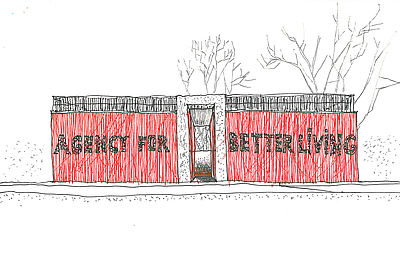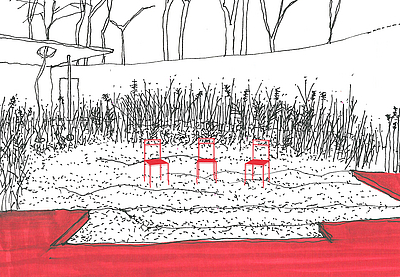Professors from the University of Art and Design Linz design Austria pavilion for Architecture Biennale 2025
Together with Michael Obrist from the Vienna University of Technology, Sabine Pollak and Lorenzo Romito from the Department raum&designstrategien will realize their project "Agency for a Better Living" in Venice.
The trio prevailed against 27 other applications, as State Secretary for Culture Andrea Mayer announced on Wednesday: Sabine Pollak and Lorenzo Romito from the Department raum&designstrategien at the University of Art and Design Linz and Michael Obrist, Professor at TU Wien, are designing the Austria Pavilion in Venice for the Architecture Biennale 2025.
The expert jury was made up of Claudia Cavallar, Angelika Fitz, Eva Guttmann, Henrieta Moravčíková and Michael Zinganel. Specifically, Obrist, Pollak and Romito want to use two contrasting approaches to show "how we want to live together in the future", as they write in their concept - namely: "With the history of the successful state or city-organized top-down model, illustrated by a hundred years of social housing planning in Vienna. And with the history of informal housing, the bottom-up model, with the reuse of ruins, abandoned buildings and ex-infrastructures, exemplified in the Eternal City of Rome in the host country Italy, in which the great displacement mechanisms of the present are manifested as well as resistance, as if in a laboratory."
Four "living settings" will be built in the pavilion: The open-air reception hall, the natural saltwater pool with a wrap-around deck in the courtyard, a living room with curved walls for film projections and the kitchen-laboratory for producing new "recipes" for better housing and living. The setting forms the framework for a choreographed ritual for everyone: arriving, cooling off, relaxing, learning and sharing. The starting point for everyone is the pool. People enjoy spending time by the pool, refreshing their ideas about living and life and discussing strategies and experiences. The "pool" factor is also a means of gaining the attention and time of the Biennale's visitors, who are always in a hurry, the three winners are convinced.
The trio goes on to explain: "Housing affects us all. In a time of multiple global crises, the question of affordable housing has long since become one of the most pressing European and international issues. However, it is not only about affordability in housing, but also about the question of what a better life could look like in the future. In our opinion, "learning from" proven systems such as Vienna's social housing and self-organized civil society projects can help to find the answers. We want to show this in the Austrian pavilion at the 2025 Venice Biennale."
Sabine Pollak, born in Graz, is an architect, teacher, researcher and author. She teaches as a professor for space & design strategies at the University of Art and Design Linz and runs the architecture firm Köb&Pollak Architektur in Vienna with Roland Köb. 1996 doctorate and 2004 habilitation in housing at the TU Vienna. Sabine Pollak works theoretically (books, essays, an ongoing urbanism blog in the Standard), teaches experimental architecture, the history of housing and architectural theory, researches the topics of housing and feminism, community and urbanism and works with her office as an expert for communal housing in Vienna. Sabine Pollak has been a visiting professor at the University of Ann Arbor, Michigan, at the Politecnico di Milano, at the Academy of Fine Arts Vienna and at the Bauhaus University Weimar. From 2015 to 2019, she was Vice Rector for International Affairs and Gender Issues at the University of Art and Design Linz, where she currently heads the PhD Research Board. Sabine Pollak has headed the Department of Architecture | Urban Studies at the University of Art and Design Linz since 2009 and took over the department raum&designstrategien in 2021, together with Lorenzo Romito, Giulia Mazzorin and Andrea Curtoni. She has curated and realized numerous exhibitions and symposia, participated in festivals and realized transdisciplinary projects. Architectural projects by Köb&Pollak Architektur have won numerous prizes and have been widely published and exhibited.
Michael Obrist, born in Bolzano, is one of the five founding partners of feld72 Architekten in Vienna and a university professor at the Vienna University of Technology. He has been Professor of Housing and Design and Head of the Research Department for Housing and Design at TU Wien since 2018. There he was also instrumental in setting up the interdisciplinary Center for New Social Housing, which was initiated jointly by TU Wien and the International Building Exhibition IBA Vienna 2022. Michael Obrist was a visiting professor at the Politecnico di Milano and at the University of Art and Design Linz. He has lectured at the Graz University of Technology, the Vienna University of Technology, the University of Art and Design Linz and the Bergen School of Architecture in Norway. He was head of the master class "(Art in) Public Space" at the International Summer Academy of Fine Arts Salzburg, a master class at the Architectural Association Visiting School Slovenia and at the summer school of the Bauhaus Kolleg Dessau. From 2017 to 2019 he was a jury member of KÖR Kunst im Öffentlichen Raum Wien. Several publications, including 2023 "The Last Grand Tour" at Park Books (with Antonietta Putzu). He was part of the guest editorial team of ARCH+ 244 "Vienna - The End of Housing (as a Typology)", for which he received the "Bruno Kreisky Prize for Social-Ecological Housing and Coexistence" together with Christina Lenart, Bernadette Krejs and the ARCH+ editorial team. The works of feld72, realized in a national and international context, have received numerous awards (including several Austrian State Prizes as well as the Gold Medal of Italian Architecture) and have been presented in renowned exhibition halls and museums as well as at various biennials worldwide (Venice, Shenzhen-Hong Kong, Sao Paulo, Rotterdam).
Lorenzo Romito, born in Rome, is professor for space&designstragies at the University of Art and Design Linz. He teaches at NABA in Rome and at the University of Roma Tre and is a visiting professor at ETH Zurich. Lorenzo Romito is an activist and strategist of common platforms for urban and ecological research such as Stalker, Osservatorio Nomade, PrimaveraRomana, Biennale Urbana or NoWorking. He is a founding member of the urban research laboratory Stalker. The experimental architecture lab Stalker has been organizing exhibitions, projects, research, symposia and teaching worldwide since 1990 and has participated in the Venice Architecture Biennale, Manifesta, the European Art Biennale in Ljubljana, Riwaq Biennale, Ramallah, Quadriennale in Rome and the IABR Rotterdam Biennale. Stalker develops experimental intervention strategies based on exploratory spatial practices using playful, sociable and interactive tactics. His work relates to an environment, its inhabitants and its local culture. Stalker was awarded the Curry Stone Prize for Social Design in 2016. Among the many exhibitions Lorenzo Romito has curated are "Islam in Sicily", a garden between two civilizations, which was curated for the Ministry of Foreign Affairs and the Orestiadi Foundation and toured the Mediterranean and the Middle East. He also curated the EU-founded stalker project Egnatia Road, a memorial for refugees, which was supported by the EU Culture 2000 program in 2004 and exhibited in Rome, Berlin, Paris, Bolzano, Lausanne, Thessaloniki and Otranto.

